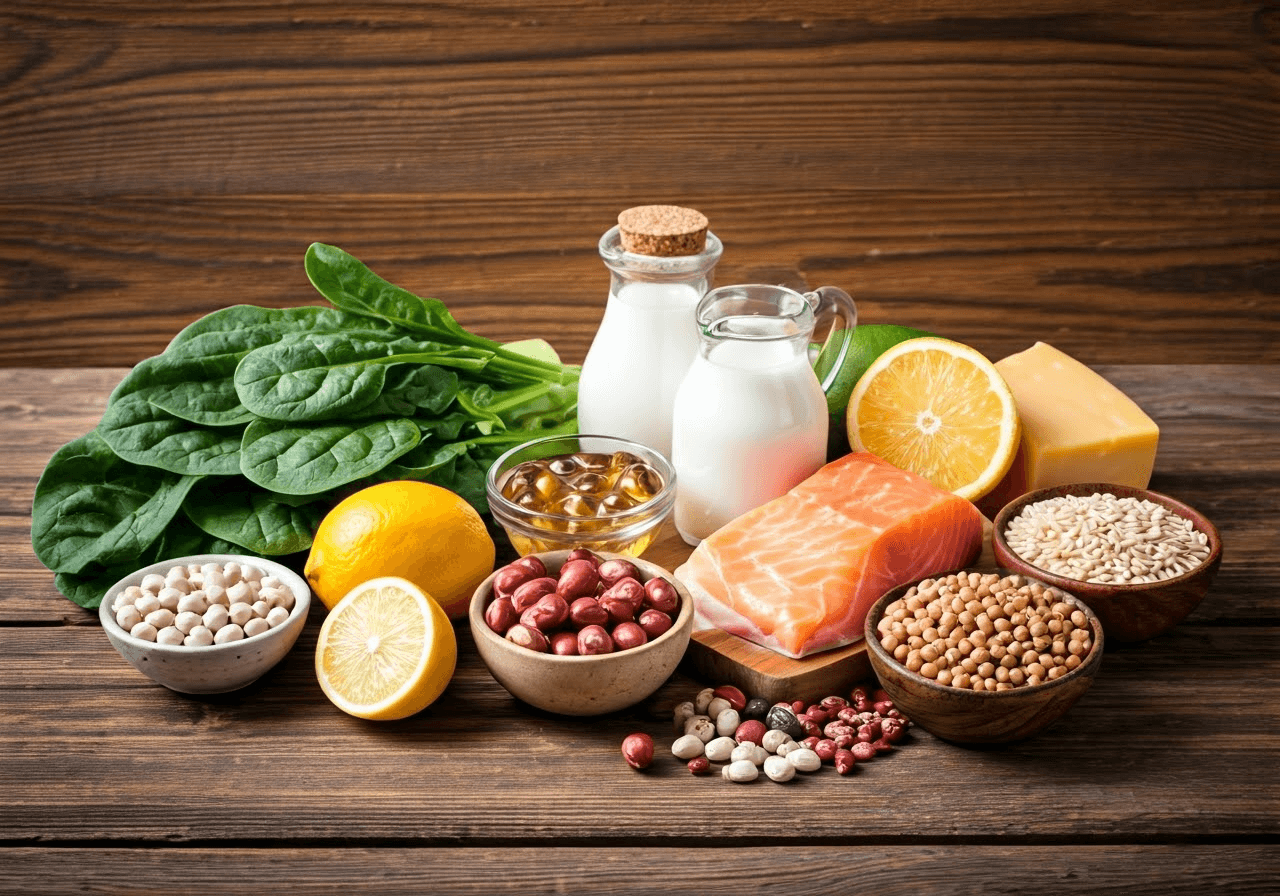
Introduction: What Are Vitamins and Why Do We Need Them?
Vitamins are important nutrients that help keep us healthy. Our bodies need these vitamins to support the immune system, create energy, and fix cell damage. While our bodies can make some nutrients, we mostly need to get vitamins from what we eat. These tiny nutrients are crucial for keeping our bodies working well, preventing sickness, and improving our overall health. Getting enough vitamins helps our bodies function at their best and supports a healthy life.
What Are Vitamins?
Vitamins are important nutrients that help the body work well. You usually get them from food or dietary supplements. The body cannot make enough vitamins alone, so they are vital for survival. Vitamins help with many things, from making energy to fixing cell damage. They support your health in many ways.
Vitamins fall into two main types: water-soluble and fat-soluble. Water-soluble vitamins like the B-complex and vitamin C dissolve in water. They move easily in the blood. Fat-soluble vitamins, such as A, D, E, and K, are stored in fat tissues and the liver, so they last longer.
Dietary supplements can help when your diet has deficiencies. But taking too many vitamins from these supplements could cause side effects. The best way to stay healthy is by eating whole foods that are rich in vitamins.
Why Does the Body Need Vitamins Daily?
The body needs vitamins every day to stay healthy and carry out important tasks. These tasks include making energy, supporting the immune system, and keeping cells healthy. Vitamins help turn food into energy, which is needed for physical and mental activities. If you don’t get enough vitamins, it can slow down your metabolism and affect how your body heals.
Daily vitamins also help the body fight off infections. For example, vitamins C and D boost immune function. They protect cells and help fight harmful germs. If you lack these essential nutrients, your immune defenses can get weaker over time.
Additionally, vitamins play a big role in overall health. They help in making hormones, support vision, and even aid in skin repair. Eating a range of nutritious foods each day ensures a steady supply of these important nutrients. This, in turn, helps the body regenerate and stay strong.
How Vitamins Support Immunity, Energy, and Overall Health
Vitamins are very important for the immune system, energy production, and mental health. Essential nutrients, like vitamin C, are known for their antioxidant properties. They help cells fight free radicals and reduce damage to tissues caused by oxidative stress.
For energy production, the B-complex vitamins are critical. They help turn food into energy that the body needs for everyday activities. Key vitamins like thiamin, niacin, and pantothenic acid play a big role in processes that change food into energy. This energy is important for staying active and focused.
Also, having the right levels of vitamins can improve mental health. For example, vitamin D helps control mood by affecting the production of serotonin, which is linked to feeling good. Together, these nutrients work well to support the immune system, enhance energy levels, and help both physical and mental health.
Understanding Vitamin Classification: Fat-Soluble vs. Water-Soluble
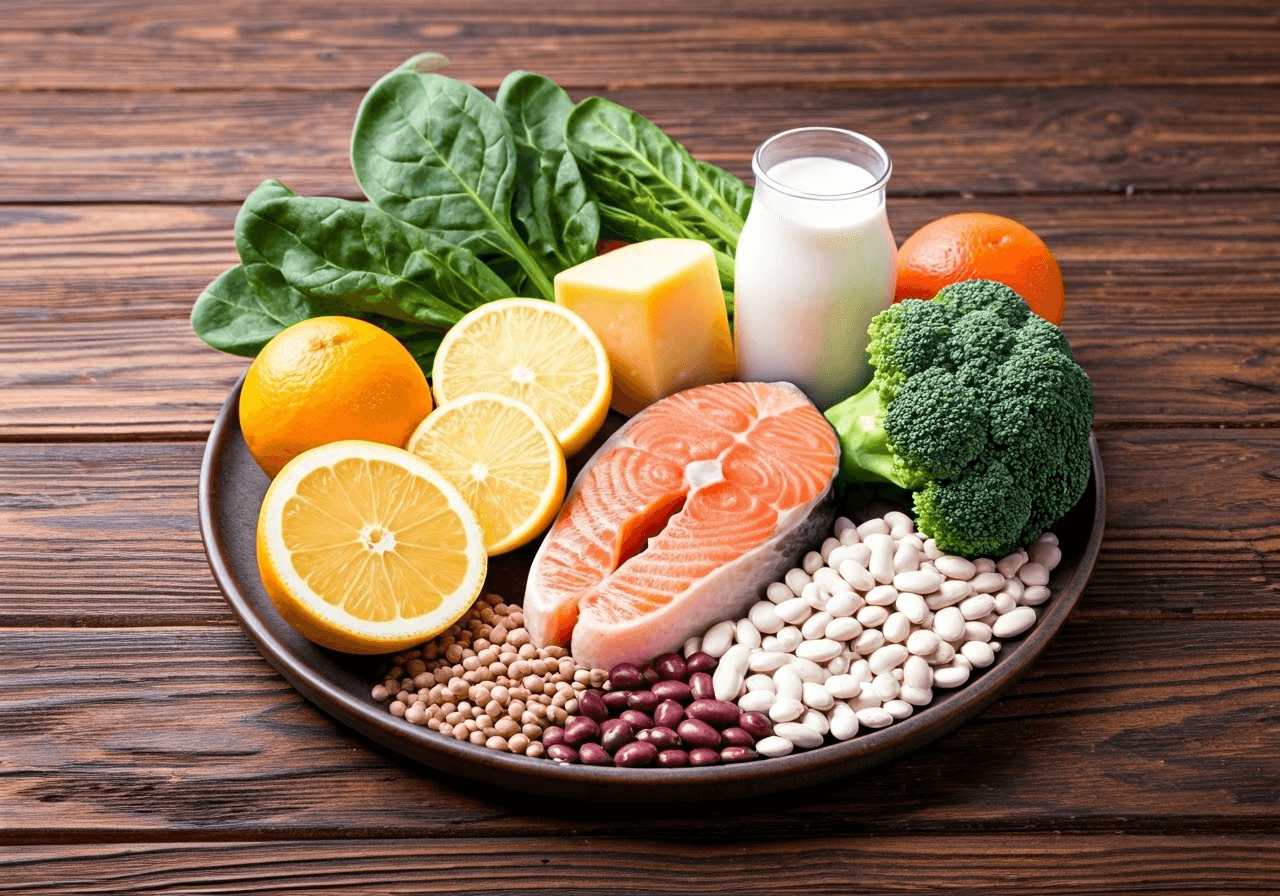
Vitamins are generally sorted into two main types: fat-soluble and water-soluble. This classification is based on how the body absorbs, stores, and uses them.
Fat-soluble vitamins, like A, D, E, and K, get stored in the liver and fat tissues. They give lasting nutrients and are absorbed with dietary fats.
On the other hand, water-soluble vitamins, including vitamin C and the B-complex, dissolve in water and enter the bloodstream easily. Any extra water-soluble vitamins leave the body through urine. This means you need to regularly add them to your diet.
Fat-Soluble Vitamins (A, D, E, K): How They Work and Are Stored
Fat-soluble vitamins, which are A, D, E, and K, are very important for good health. These vitamins get absorbed with dietary fats. They are stored in the liver and fat tissue. This storage lets the body use them when it needs to. Vitamin A helps with vision and immune function. Vitamin D is important for strong bones and mood. Vitamin E is a strong antioxidant that protects cells from free radicals. Vitamin K is key for blood clotting. Eating a balanced diet full of these vitamins can improve overall wellness. You can find them in foods like leafy greens and fatty fish.
Water-Soluble Vitamins (B-Complex, C): Absorption and Excretion
Water-soluble vitamins are very important for our body. This group includes vitamin C and B-complex vitamins. These vitamins dissolve in water, which helps our body absorb them easily when we eat. However, our body does not store them. Instead, any extra vitamins go out in our urine. That’s why we need to eat them regularly as part of a healthy diet. Good sources of these vitamins are whole grains, poultry, fish, and citrus fruits. Eating these foods helps us maintain optimal health. They also support energy production, immune function, and brain health.
Table: Key Differences Between Fat-Soluble and Water-Soluble Vitamins
| Feature | Fat-Soluble Vitamins | Water-Soluble Vitamins |
|---|---|---|
| Solubility | Dissolve in fat and organic solvents | Dissolve in water |
| Vitamins | A, D, E, K | B Vitamins (B1, B2, B3, B5, B6, B7, B9, B12) & Vitamin C |
| Absorption | Absorbed with dietary fats; require bile salts. Enter the lymphatic system before reaching the bloodstream, aiding in fat-soluble vitamin absorption. | Absorbed directly into the bloodstream (often via active transport or diffusion) for immediate use. |
| Transport | Require protein carriers (e.g., lipoproteins) for transport in blood. | Most circulate freely in the blood plasma. |
| Storage | Stored in fat tissues and liver, sometimes for months. Includes long-term storage of vitamins A and D. | Minimal storage (except vitamin B12 in liver); excess is typically excreted. |
| Excretion | Slowly excreted through bile into feces; less likely through urine. Increases risk of accumulation. | Excess is quickly removed via kidneys and urine, reducing toxicity risk. |
| Toxicity | Higher risk due to storage potential (hypervitaminosis A/D). | Lower risk; most are flushed out, though megadoses may cause side effects. |
| Frequency of Intake | Can be consumed less frequently due to storage. | Require frequent (often daily) intake to maintain optimal levels. |
| Deficiency Symptoms | Develop slowly due to body reserves. | Appear more quickly due to lack of storage, especially for B vitamins. |
Deep Dive into Essential Vitamins
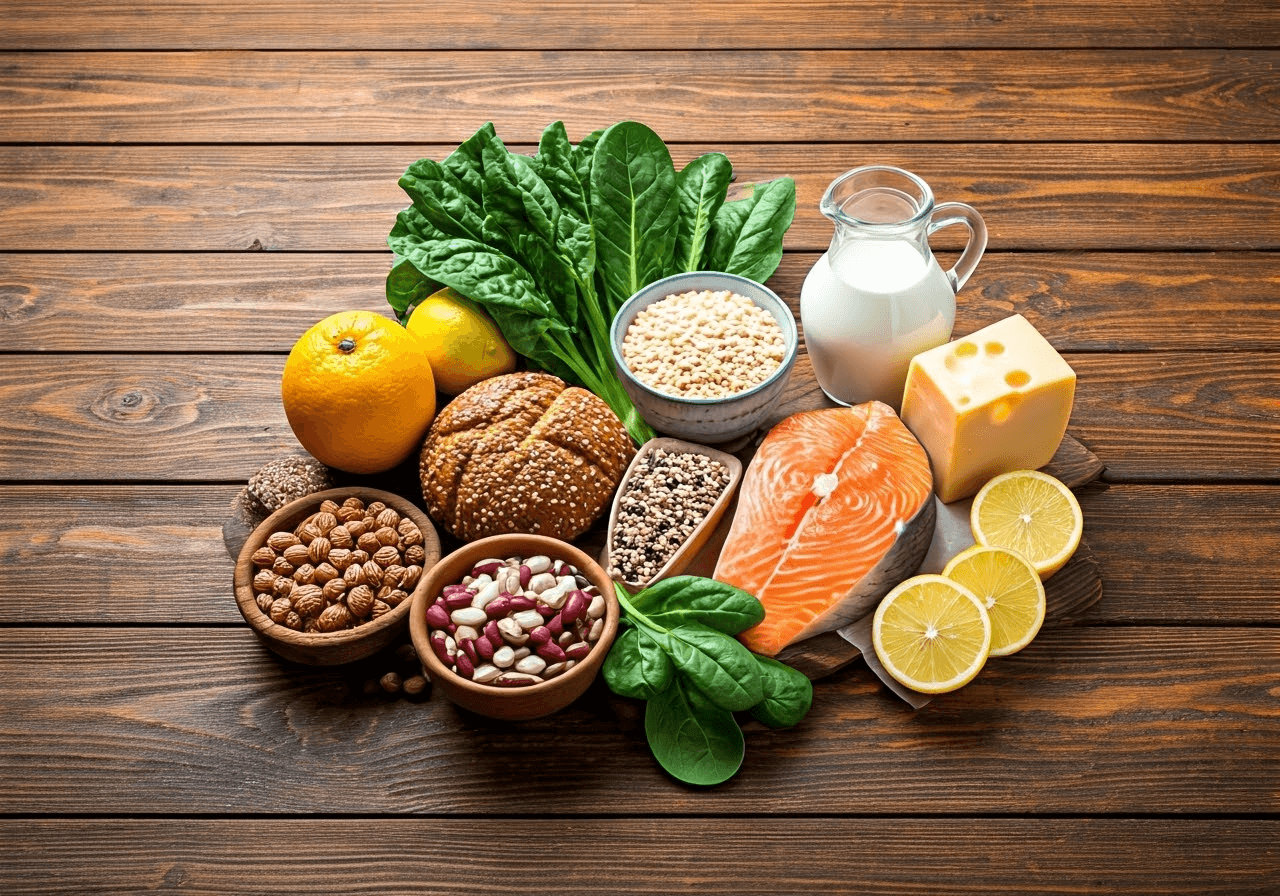
Understanding essential vitamins is key to good health and nutrition. Each vitamin has its special role. They help with things like energy production, immune function, and keeping organs healthy. For instance, vitamin A helps with vision and skin repair. B-complex vitamins support metabolism.
Vitamin C is important for immunity and acts as an antioxidant. Vitamin D is great for bone health and lifting your mood. Both fat-soluble and water-soluble vitamins are crucial for daily needs. Mixing healthy foods with supplements, when needed, helps meet your vitamin needs at different life stages.
Vitamin A (Retinol/Carotenoids) helps with your vision, supports your immune system, and keeps your skin healthy.
Vitamin A is important for clear vision. It comes in two main forms: retinol and carotenoids. Both are good for our eyesight, especially in low light. They help create pigments in the retina. Aside from eye health, vitamin A is key for a strong immune system. It helps the body fight infections. Its antioxidant qualities are also great for the skin. They improve cell turnover and keep skin moist. This can reduce early aging and enhance the overall appearance of your skin.
B-Complex Vitamins: Energy, Food Use, Nerve Work
Think of the B-complex vitamins as a group of important helpers. Each one has a key job, and they all work together to keep your body running well. They are essential for turning the food you eat into energy, which supports your brain, and helps your nerves stay healthy. Even though they are usually seen as a group, each B vitamin has a special role:
- Vitamin B1 (Thiamine): This vitamin helps your body change carbohydrates into energy. It keeps your energy levels high.
- Vitamin B2 (Riboflavin): This vitamin is a strong antioxidant. It helps make energy and grow cells.
- Vitamin B3 (Niacin): This vitamin has many jobs. It aids energy use and helps keep your skin healthy. It can also help manage cholesterol levels.
- Vitamin B5 (Pantothenic Acid): This vitamin helps make hormones and cholesterol. It also plays a part in releasing energy.
- Vitamin B6 (Pyridoxine): This vitamin is important for your brain. It supports normal development and helps produce feel-good chemicals like serotonin.
- Vitamin B7 (Biotin): This vitamin is known for promoting healthy hair, skin, and nails. It also helps in the body’s metabolism.
- Vitamin B9 (Folate/Folic Acid): This vitamin is necessary for making DNA and growing cells. It’s especially important during pregnancy to help prevent birth defects.
- Vitamin B12 (Cobalamin): This vitamin helps form red blood cells and keeps nerve cells healthy. It’s often a concern for people who do not eat animal products.
Getting enough of the whole B-Complex is important. They usually work well together.
Vitamin C: Boosts Immunity, Fights Free Radicals & Supports Collagen
Vitamin C, also known as Ascorbic Acid, is one of the most famous vitamins. It is important for the body’s defense against sickness. It helps make white blood cells, which are important for fighting infections. Besides helping the immune system, Vitamin C is also a strong protector. It stops your cells from getting hurt by unstable molecules called free radicals.
This power protects your skin. Vitamin C is important for making collagen. Collagen is a protein that keeps your skin strong and flexible. It helps your skin look young and helps wounds heal.
While supplements are common, you can get a lot of Vitamin C from natural food sources. These include citrus fruits like oranges and lemons, as well as berries, bell peppers, broccoli, and tomatoes. Eating these whole foods gives you Vitamin C along with other good nutrients and fiber. Supplements can help if you don’t eat enough or when your body needs more.
Vitamin D (D2/D3): Healthy Bones, Improved Mood & Immune System
Often called the “sunshine vitamin,” Vitamin D is important for more than just bone health. It helps your body absorb calcium to create strong bones and teeth. But it does more than that. New research shows that having enough Vitamin D can improve your mood and support a strong immune system.
Your body makes Vitamin D when your skin gets sunlight. But things like where you live, what time of year it is, your skin color, and using sunscreen can reduce how much Vitamin D you produce. This makes not having enough Vitamin D common around the world. You can find it in food sources like fatty fish and fortified items, but these often don’t give you enough. As a result, many people have to take supplements. The amount you need can be different for everyone, so it is a good idea to check your levels.
When you pick supplements, you will find Vitamin D2 (ergocalciferol, often from plants) and Vitamin D3 (cholecalciferol, mostly from animals or lichen). Most studies show that D3 is better at increasing and keeping blood Vitamin D levels. This is why many people prefer it.
Vitamin E: Antioxidant & Skin Protection
Vitamin E is a nutrient that dissolves in fat. It works as a strong antioxidant, and this is likely its most important job. Vitamin E helps keep cell membranes safe from oxidative stress. This stress can harm cells as time goes by. By protecting cells, it helps improve overall health. It may also help in stopping long-term diseases.
Its benefits are especially recognized for skin health. Vitamin E acts as an antioxidant. It can help shield the skin from harm caused by UV rays and pollution. It is also known to keep the skin moisturized.
Vitamin E is not just one thing. It is made up of eight related parts. These parts are split into two groups: tocopherols and tocotrienols. Alpha-tocopherol is the most common type found in supplements. The way your body uses and the specific roles of these forms can be a bit different. Having whole foods like nuts, seeds, and vegetable oils is a good way to get a mix of these healthy parts.
Vitamin K: Blood Clotting & Bone Support
Vitamin K is very important, but it is often ignored. It helps with two key things: blood clotting and bone health. If you don’t have enough vitamin K, your blood might not clot the right way after you get hurt.
There are two main forms:
- Vitamin K1 (Phylloquinone): This vitamin is mainly in leafy green vegetables like spinach, kale, and broccoli. Its main job is to help activate the proteins that are needed for blood to clot.
- Vitamin K2 (Menaquinones): You can find K2 in fermented foods like natto and some cheeses, as well as in animal products like liver and egg yolks. It is also made by the bacteria in our gut. K2 has a bigger role in bone health and might also help with heart health.
How does K2 help our bones and heart? It turns on proteins that help put calcium into bones and teeth where it should be. This is very important because it also stops calcium from building up in soft parts, like arteries, which is essential for heart health. The different jobs of K1 and K2 show how important it is to have a variety of foods in our diet or good supplements if needed.
Recognizing Vitamin Deficiency: Signs and Symptoms
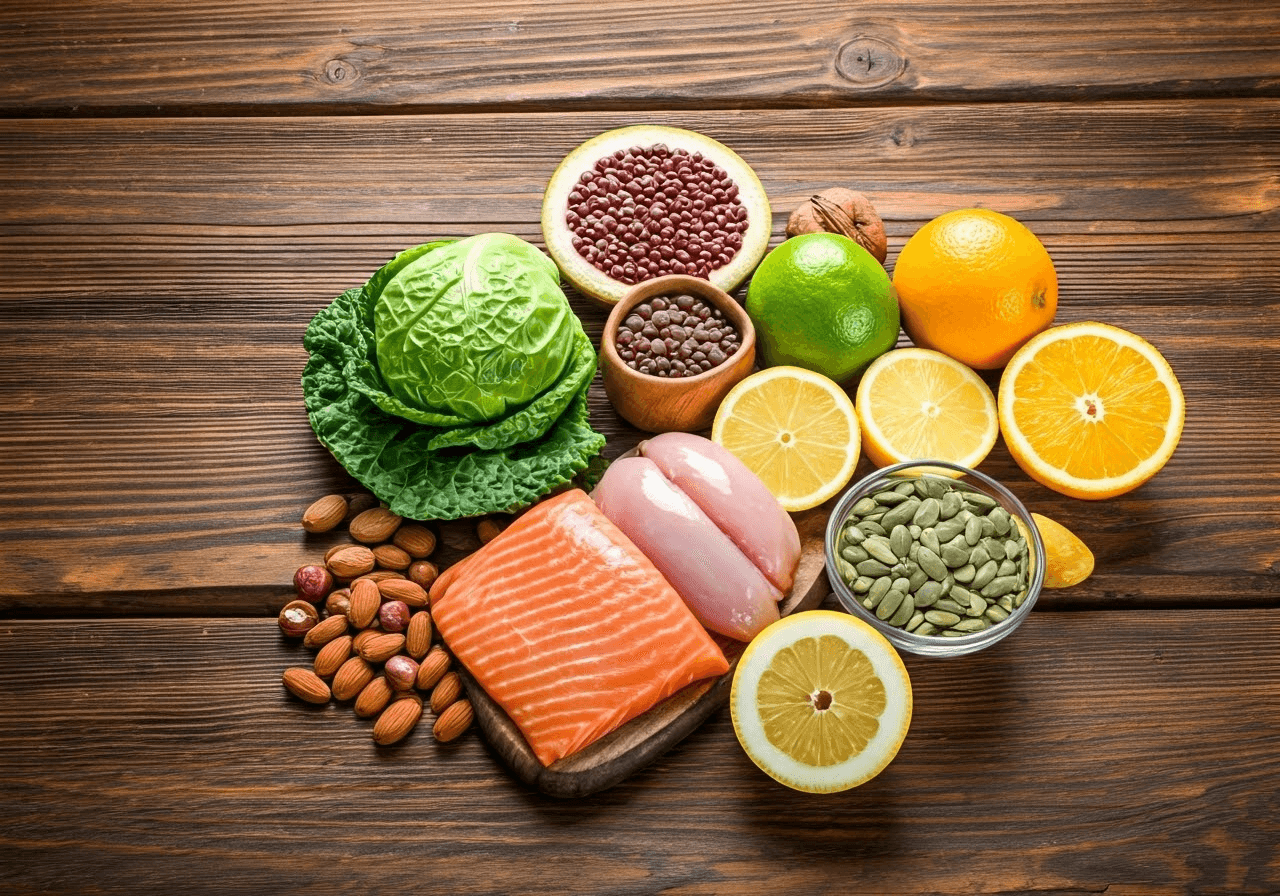
A variety of signs can show that you might have low vitamin levels. Each sign can point to different nutrient needs. For example, feeling tired, having mood swings, or facing skin problems might mean you’re missing essential vitamins like B-complex and vitamin E. Similarly, bad eyesight or getting sick often might indicate that you need more vitamin A or D. Recognizing these signs early can help you change your diet or take supplements in time. By regularly checking in with your health and being aware of what you eat, you can help support your overall wellness. This way, you ensure that every essential vitamin is available for your optimal health.
Common Signs of Vitamin Deficiencies
Fatigue and constant tiredness can be signs that your body is missing certain vitamins. This is especially true for vitamins B12 and D. Skin problems, like dryness or rashes, may mean you need more vitamin E or healthy fats. Changes in mood, such as feeling more irritable, could be linked to not having enough B vitamins. Also, if you get infections often, it might show that your immune system is not strong enough because of low vitamin C or D levels. Keeping an eye on these signs is important. It helps you be aware and encourages you to balance your nutrition for optimal health and well-being.
Symptoms by Specific Vitamin
Deficiencies in certain vitamins can show up in different signs. Each sign points to the vitamin missing. For example, not having enough vitamin A might cause problems with vision. A lack of vitamin D can lead to bone pain or weak muscles. Also, not enough vitamin C could make you feel tired and more likely to get sick, which affects your immune function. B vitamins are important for energy production and brain health. If you do not get enough of them, you may feel tired, irritable, or have trouble thinking clearly. Spotting these signs early can help you change your diet or use supplementation quickly.
How to Check for Vitamin Deficiencies: Blood Tests & Indicators
Finding out if someone has a vitamin deficiency usually requires blood tests. These tests check how much of certain nutrients are in the blood. Common vitamins tested include D, B12, and folate. These tests help us understand the body’s ability to absorb these essential vitamins. Watching for signs like tiredness or changes in mental health can also help when checking nutrition. Good lab results are important. They can show if there are deficiencies. This leads to healthyDiet changes or recommendations for supplementation. These changes can support overall health and good immune function. Regular check-ups are important for keeping nutrient levels balanced at different life stages.
Vitamin Needs Through Life Stages: Age & Specific Groups
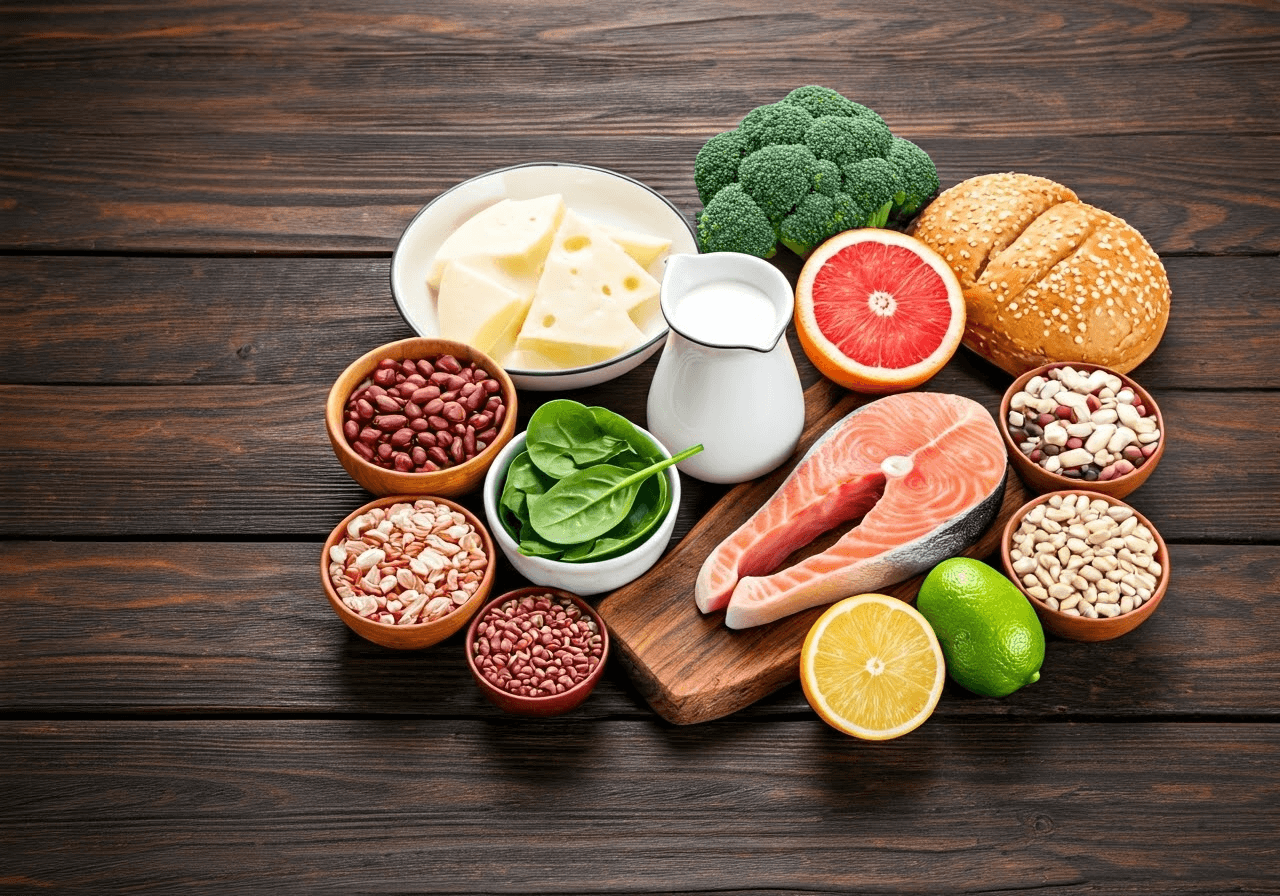
Vitamin needs change as we go through different stages of life. Children and teenagers need plenty of B vitamins, vitamin D, and calcium. These help with growth and brain development. Pregnant and breastfeeding women need more folic acid and iron. This helps prevent birth defects and supports the health of the baby. As people get older, it’s important to have enough vitamin D and vitamin K for strong bones and good health. Athletes and those with active lives should focus on B vitamins and antioxidants. This helps boost energy production, stamina, and recovery, leading to better performance and well-being.
Vitamin Needs for Children and Teenagers
Growing bodies and developing minds need many essential vitamins for good health. Vitamin D is important for strong bones. B vitamins, like folic acid and B12, are necessary for energy production and brain health. Iron is also needed during these growth years, especially for teenage girls, to avoid deficiencies. Eating a balanced diet full of fruits, vegetables, whole grains, and proteins helps children and teens get enough of these vital nutrients. This sets them up for a healthy future.
Vitamin Requirements During Pregnancy and Breastfeeding
Nutritional needs increase during pregnancy and breastfeeding. This makes getting enough vitamins very important for the health of mothers and the growth of babies. Folic acid is a key vitamin that helps with brain development and can prevent birth defects. Vitamin D is good for bones and the immune system. B vitamins are important for energy production and mental health. During breastfeeding, vitamins E and K help the baby’s growth and immune function. Eating a varied diet with leafy greens, whole grains, and fortified foods helps mothers get these essential nutrients.
Adult and Senior Vitamin Recommendations
Optimal health for adults and older people depends a lot on getting the right vitamins. Adults need enough vitamin D to help with bone health and immune function. This is important because our bodies absorb vitamins less effectively as we age. Older adults should also have more vitamin B12 to help with brain health and energy production. Vitamins C and E, which are antioxidants, can help protect against the stress linked to long-term health issues. Eating a diet that includes fruits, vegetables, nuts, and whole grains helps the body get the essential nutrients it needs. This supports vitality and overall wellness.
Vitamins for Athletes and Physically Active People
Maintaining good performance means athletes need to watch their vitamin intake closely. Key vitamins like B-complex help with energy production and support the nervous system. Vitamin D is important for strong bones and immunity, which are vital for endurance in sports. Antioxidants, like vitamin C and E, fight free radicals that come from hard exercise. This helps with recovery and reduces inflammation. Also, vitamin K is important for heart health, which is necessary for keeping up with exercise. A balanced diet full of these nutrients can greatly improve athletic performance and overall health.
Getting Vitamins from Food: Best Dietary Sources

A variety of foods gives you important nutrients. Eating colorful fruits and vegetables like sweet potatoes, kale, and citrus fruits offers a good amount of vitamins A, C, and K. Lean proteins, such as poultry and fatty fish, provide vitamin D and helpful omega-3 fatty acids. Whole grains like brown rice and oats are sources of B vitamins that are needed for energy production. For the best health, trying plant-based foods like legumes, nuts, and seeds can boost your vitamin intake. They also help the immune system and keep you feeling good.
List of Foods Rich in Essential Vitamins
A variety of foods is a great source of essential vitamins that are important for good health. Leafy greens, like spinach and kale, have a lot of vitamin K. Citrus fruits are rich in vitamin C. Dairy products, such as yogurt and cheese, provide vitamin D, which is important for strong bones and immune function. Fatty fish, such as salmon and mackerel, are strong in vitamin E and have good antioxidant properties. Legumes and whole grains provide vital B vitamins. These support energy production and brain health. Including these foods is key for a balanced diet.
Comparing Animal-Based vs. Plant-Based Sources
There are clear differences between animal-based and plant-based sources of essential nutrients. Animal products, like fatty fish, red meat, and dairy, give us vitamins that we can absorb easily, such as B12 and vitamin D. These foods are also high in important amino acids. These amino acids support good brain health and help with energy production. In contrast, plant-based sources, such as whole grains, green vegetables, and legumes, are rich in antioxidants, fiber, and vitamins like folate and vitamin K. Using both animal and plant sources can improve the variety of nutrients we get, which helps our overall health.
How Cooking Affects Vitamin Content in Foods
Cooking in different ways can change the vitamin levels in food. This could make it harder to get the important nutrients you need. For example, vitamins that dissolve in water, such as vitamin C and B vitamins, may leak into the cooking water when you boil food. On the other hand, methods like steaming or microwaving can keep these nutrients safe. Fat-soluble vitamins, like vitamin E and vitamin K, hold up against heat better. However, they can lose some value if cooked at high temperatures for too long. To keep more nutrients, it’s best to use gentle cooking methods and less water.
Table: Vitamins Nutrient Sources Comparison
| Vitamin | Predominant Animal-Based Sources | Predominant Plant-Based Sources | Notes / Considerations |
|---|---|---|---|
| Vitamin A | Retinol: Liver, fish oils, eggs, dairy (milk, butter, cheese) | Carotenoids: Carrots, sweet potatoes, spinach, kale, pumpkin, red/yellow bell peppers, mangoes, apricots | Animal sources provide preformed vitamin A (Retinol); plant sources provide provitamin A (Carotenoids), which the body must convert. |
| Vitamin B1 (Thiamine) | Pork, liver, poultry, fish, eggs, fortified foods | Whole grains, legumes (beans, lentils), nuts, seeds, fortified cereals/breads | Found in both food groups. Refining grains reduces content; fortification restores it. |
| Vitamin B2 (Riboflavin) | Dairy (milk, yogurt, cheese), liver, eggs, meat, fish | Leafy greens, legumes, nuts, mushrooms, fortified cereals/breads | Animal sources—especially dairy—are among the richest. |
| Vitamin B3 (Niacin) | Meat (poultry, beef, pork), fish (tuna, salmon), liver, eggs | Whole grains, legumes, nuts, seeds, mushrooms, potatoes, fortified cereals/breads | The body can convert tryptophan to niacin. Animal sources are more bioavailable. |
| Vitamin B5 (Pantothenic Acid) | Liver, meat, poultry, fish, eggs, dairy | Mushrooms, avocados, broccoli, whole grains, legumes, sweet potatoes | Found in almost all foods. Deficiency is rare. |
| Vitamin B6 (Pyridoxine) | Meat, poultry, fish (tuna, salmon), liver, eggs | Chickpeas, potatoes, bananas, fortified cereals, spinach, nuts | Better absorbed from animal sources, but plant options are still effective. |
| Vitamin B7 (Biotin) | Egg yolks, liver, fish, meat, dairy | Nuts (almonds, peanuts), seeds (sunflower), legumes (soybeans), sweet potatoes, cauliflower | Raw egg whites contain avidin, which inhibits absorption. Gut bacteria also produce small amounts. |
| Vitamin B9 (Folate/Folic Acid) | Liver, eggs (lower levels than in plants) | Leafy greens (spinach, romaine), legumes (lentils, beans), asparagus, broccoli, avocados, fortified grains (folic acid) | Natural folate is plant-based; folic acid is synthetic and used in fortified foods and supplements. |
| Vitamin B12 (Cobalamin) | Meat, poultry, fish, shellfish, eggs, dairy | Fortified cereals, plant milks, nutritional yeast (fortified only) | Naturally found only in animal products. Vegans must get it from supplements or fortified foods to prevent deficiency. |
| Vitamin C (Ascorbic Acid) | Small amounts in organ meats (liver, kidney) | Citrus fruits, berries, kiwi, bell peppers, tomatoes, broccoli, spinach, potatoes | Primarily plant-based. Highly sensitive to heat; best from raw or lightly cooked foods. |
| Vitamin D | Fatty fish (salmon, mackerel), fish liver oils, egg yolks, fortified dairy | Fortified plant milks (soy, almond, oat), cereals, UV-exposed mushrooms | Sun exposure is the main natural source. D3 (cholecalciferol, from animals) is more effective than D2 (ergocalciferol, from plants). |
| Vitamin E | Minor amounts in egg yolks and fatty tissues | Nuts (almonds, hazelnuts), seeds (sunflower), vegetable oils (sunflower, safflower, wheat germ), leafy greens, avocados | Plant oils, especially sunflower and wheat germ, along with nuts and seeds, are top sources. |
| Vitamin K | K2 (menaquinone): Liver, egg yolks, butter, cheese, fermented foods (natto) | K1 (phylloquinone): Leafy greens (kale, spinach, broccoli, Brussels sprouts) | K1 supports blood clotting; K2 supports calcium regulation and heart/bone health. |
How to Choose High-Quality Vitamin Supplements

Choosing good vitamin supplements takes some careful thought. You need to think about bioavailability. This means how well the body’s ability to absorb and use the nutrients. It’s important to find supplements that give essential vitamins in their best forms. Also, read the labels closely. Check the dosage, see what’s in them, and look for trusted certifications to make sure they are safe and effective. Whole food-based supplements can be better because they often work better together than synthetic ones. This can help with overall nutrient absorption. Always talk to a healthcare provider, especially if you take prescription medications or have certain health issues.
Understanding Bioavailability and Vitamin Forms
Factors that affect how well the body takes in vitamins include their chemical types and other nutrients we consume. Fat-soluble vitamins, like A, D, E, and K, need dietary fats to be absorbed well. On the other hand, water-soluble vitamins, such as B vitamins and vitamin C, dissolve in water. This affects how easily we can use them. Certain foods can either help or hinder absorption as well. For example, vitamin C can boost iron absorption from plant sources. But, phytates found in whole grains may reduce how minerals are taken in. Knowing these factors is important for making the most of essential nutrients.
Reading Supplement Labels: Dosage, Ingredients, Certifications
Understanding supplement labels is important for your health. First, check the dosage. This tells you how much of each nutrient is in one serving. Next, look at the ingredient list. Be aware of any fillers or additives that might not help your health. Certifications from recognized groups, like the National Institutes of Health, can show the product’s quality and safety. Lastly, know about bioavailability. This affects the body’s ability to absorb and use essential nutrients.
Whole Food vs. Synthetic Vitamins: Which is Better?
When choosing between whole food vitamins and synthetic vitamins, think about how well your body can absorb them, how they help your health, and your specific needs. Whole foods usually have more good compounds, while synthetic vitamins can give targeted nutrients. It’s a good idea to talk to a healthcare professional for advice that fits you.
Table: Whole Food Vitamins vs. Synthetic Vitamins
| Feature | Whole Food Vitamins | Synthetic Vitamins |
|---|---|---|
| Source / Origin | Derived from concentrated whole foods (fruits, vegetables, yeast). Processed to retain full vitamin complexes. | Created chemically in a lab setting. Contain isolated vitamin molecules. |
| Composition | Includes vitamins plus natural co-factors (enzymes, phytonutrients, antioxidants) found in food. | Typically contains just the isolated vitamin molecule—sometimes as synthetic isomers not found in nature. |
| Absorption / Bioavailability | Believed to be better absorbed due to synergistic plant compounds like enzymes and phytonutrients. Some natural forms (e.g., methylated B vitamins) may be more biologically active. | Often highly bioavailable and effective at raising blood levels. Structure may be identical or slightly different from natural forms, depending on vitamin type. |
| Co-factors & Synergy | Naturally includes compounds that support absorption and function (e.g., minerals, co-enzymes). | Lacks the full nutrient matrix. Often relies on isolated forms only. |
| Potency & Dosage | Typically lower potency per dose. Dosage may vary due to natural ingredient variability. | Can deliver high, precise, standardized doses for specific deficiencies. |
| Purity & Standardization | May have natural variation between batches. Requires sourcing controls to avoid heavy metals or pesticides. | Consistently standardized. Easier to purify but may contain synthetic fillers or non-natural residues. |
| Cost | Usually more costly due to raw ingredients and less scalable processing methods. | More affordable due to mass production and chemical synthesis. |
| Research Support | Most studies focus on the benefits of whole food diets, not necessarily supplements. Less direct research on whole food supplement formats. | Strong clinical research backing, especially for treating or preventing deficiencies. Most scientific trials use synthetic forms. |
| Allergens / Sensitivities | May include allergens related to the food source (e.g., soy, yeast, wheat). | Less likely to contain common food allergens but may include fillers, binders, or artificial coloring. |
| “Natural” Perception | Often marketed as more holistic, natural, and in harmony with how the body absorbs nutrients. | Often viewed as artificial or “chemical,” despite clinical effectiveness. |
| Potential Advantages | – Contains beneficial co-factors – May offer enhanced synergy – Perceived as more “natural” |
– High potency options – Lower cost – Easier to standardize – Widely researched – Typically allergen-free |
| Potential Disadvantages | – Higher cost – Lower precision in dosage – Allergen risk – Less clinical research support |
– Lacks full nutrient complex – May include synthetic byproducts – Perceived as less natural |
Vitamin Safety and Potential Interactions with Medications
Understanding vitamin safety is very important, especially for people taking prescription medications. Some vitamins, like vitamin E and K, can affect anticoagulant drugs. This may increase bleeding risks or change how bleeding works. Plus, high doses of vitamin C can impact how well some medications work. B vitamins, which include folate, can also affect prescriptions that help regulate mood. Always talk to your healthcare provider before taking any dietary supplements. It is important to check for interactions. This ensures that essential nutrients work together for your optimal health, instead of hurting your overall well-being.
Table: Common Vitamin–Medication Interactions
| Vitamin | Safety/Toxicity Concerns (Especially at High Doses) | Common Interacting Medications | Nature of Interaction | Notes / Recommendations |
|---|---|---|---|---|
| Vitamin A (Retinol) | Hypervitaminosis A: Liver damage, birth defects, bone pain, blurred vision. Beta-carotene is less toxic. | Retinoids (e.g., Isotretinoin), Warfarin, Orlistat, Bile Acid Sequestrants | Additive toxicity (retinoids), increased bleeding risk (warfarin), reduced absorption (Orlistat, sequestrants) | Avoid high doses during pregnancy. Monitor intake with retinoids or warfarin. Take separately from fat blockers. |
| Vitamin B1 (Thiamine) | Generally low toxicity. Deficiency can cause Wernicke’s encephalopathy. | Loop diuretics (e.g., Furosemide), alcohol | Diuretics increase thiamine excretion. Alcohol impairs absorption. | At-risk individuals (e.g., alcohol use disorder, elderly) may need supplementation. Monitor thiamine status. |
| Vitamin B3 (Niacin) (Therapeutic doses) | Flushing, liver toxicity, high blood sugar, gout flares (especially at high doses). | Statins, blood pressure medications (e.g., beta-blockers), diabetes medications, Allopurinol | Myopathy with statins, additive blood pressure lowering, worsens glucose control, raises uric acid | Applies mainly to high-dose niacin therapy. Monitor liver enzymes, blood glucose, and uric acid. |
| Vitamin B6 (Pyridoxine) | Nerve damage (peripheral neuropathy) with chronic high intake (>100–200 mg/day). | Levodopa (without Carbidopa), Phenytoin, Phenobarbital | Reduces effectiveness of Levodopa; may lower seizure medication levels | Most Parkinson’s meds include Carbidopa. Avoid excess B6 with seizure medications unless supervised. |
| Vitamin B7 (Biotin) | Low toxicity. Can interfere with lab results (thyroid, cardiac biomarkers). | Not drug-related, but interferes with lab tests (e.g., TSH, troponin) | Disrupts immunoassays, leading to false lab results | Discontinue biotin 2–3 days before lab work. Inform healthcare providers if taking >5,000 mcg/day. |
| Vitamin B9 (Folate/Folic Acid) | May mask symptoms of B12 deficiency. UL = 1,000 mcg/day (synthetic). | Methotrexate, anticonvulsants (Phenytoin, Phenobarbital) | Can reduce efficacy of Methotrexate; mutual depletion with anticonvulsants | Use only under doctor’s supervision. Monitor B12 status when using high-dose folic acid. |
| Vitamin B12 (Cobalamin) | Low toxicity. Deficiency causes anemia, nerve damage. | Metformin, PPIs (e.g., Omeprazole), H2 blockers (e.g., Ranitidine) | Impaired B12 absorption over time | Long-term users of Metformin or acid reducers should test B12 levels annually. Consider B12 supplementation if low. |
| Vitamin C (Ascorbic Acid) | GI upset at very high doses (>2,000 mg/day), risk of kidney stones | Chemotherapy, estrogen-containing medications, statins/niacin, Warfarin (high doses) | May reduce effectiveness of chemotherapy, increase estrogen levels, minor Warfarin interaction | Consult an oncologist before high-dose use. Generally safe in moderate amounts. |
| Vitamin D | Hypercalcemia, kidney stones, soft tissue calcification with high intake | Thiazide diuretics, corticosteroids (e.g., Prednisone), Digoxin, Orlistat, Bile Acid Sequestrants | Thiazides raise calcium levels; steroids reduce vitamin D activity; Digoxin toxicity increases with hypercalcemia | Monitor serum calcium if supplementing. Take separately from fat blockers. Discuss steroid use with your physician. |
| Vitamin E | Increased bleeding risk with high doses (>1,000 mg/day); may interfere with vitamin K | Warfarin, Aspirin, Clopidogrel, chemotherapy agents, Orlistat | Enhances bleeding risk, may reduce chemotherapy efficacy, absorption reduced by Orlistat | Avoid high doses with blood thinners. Discontinue before surgery. Consult your oncologist if in treatment. |
| Vitamin K | Low toxicity (K1, K2). Synthetic K3 (menadione) is not approved for supplements. | Warfarin, broad-spectrum antibiotics, Orlistat, Bile Acid Sequestrants | Counteracts Warfarin, lowers clotting control. Antibiotics reduce K2 production; absorption blocked by fat blockers | Maintain consistent vitamin K intake on Warfarin. Inform your provider of any supplement or dietary changes. |
Conclusion
Incorporating vitamins into your daily life is very important for good health at all life stages. Knowing what vitamins you need and where to find them, like in green vegetables, fatty fish, and whole grains, helps you make better choices. Spotting signs of deficiencies right away can help improve your immune function and general well-being. If you think about taking supplements, it’s important to know about how well your body absorbs them and the quality of the ingredients. Staying informed about vitamins not only helps your physical health but also strengthens your mental health. This can help create a bright and healthy future. Embracing good nutrition in a balanced way is key.
The content on WellwayHub.com is intended for general informational purposes only and should not be taken as medical advice. Please consult your doctor or a qualified health professional before making any changes to your health routine.
Some links on WellwayHub.com may be affiliate links. This means we may earn a small commission if you make a purchase through these links, at no extra cost to you. This helps support our mission to provide trusted wellness content.
Frequently Asked Questions
Signs that you may not have enough vitamins can include being tired, feeling weak, having skin problems, and experiencing changes in your mood. The symptoms can change based on which vitamin you lack. For instance, not having enough vitamin D might cause pain in your bones. To get a proper diagnosis, blood tests are important. They help in deciding the right supplementation or changes in your diet.
A balanced diet usually gives us essential vitamins. But some people might still need multivitamins. This can help with any missing nutrients. Things like age, lifestyle, and health problems can change what vitamins a person needs. It’s important to look at your own diet and talk to a healthcare professional.
Taking too many vitamins can be harmful, especially with fat-soluble vitamins like A, D, E, and K. Signs of this can include nausea, headaches, and even more serious health problems. It is important to talk to a healthcare provider before you increase your vitamin intake. This will help you avoid any risks.
The best time to take vitamins depends on what type they are. Fat-soluble vitamins like A, D, E, and K work best when taken with meals. This helps your body absorb them properly. Water-soluble vitamins, such as B-complex and C, can be taken at any time during the day. It’s important to be consistent with taking them for the best results.
Vitamins that improve immune function are important for your health. Vitamin C is known for its antioxidant properties. Vitamin D helps to control how your immune system works. Vitamin A is key for keeping your mucosal health in good shape. Adding these vitamins to your meals can help strengthen your body’s ability to fight off infections.
Daily needed amounts of essential vitamins change based on age, gender, and life stage. For instance, adults usually need 900 mcg of vitamin A, 75 mg of vitamin C, and 600 IU of vitamin D. It is a good idea to check dietary guidelines or talk to a healthcare professional to get advice that is right for you.
Vitamins and minerals can work together and affect how well the body absorbs them. For example, calcium can reduce how much magnesium and iron the body can use. On the other hand, vitamin C helps the body absorb iron better. Knowing how these nutrients interact is important. It can help you take in the right amounts and avoid deficiencies.
To see if you’re taking too many supplements, watch for signs like nausea, headaches, or stomach problems. Also, it’s a good idea to talk to a healthcare professional. They may suggest blood tests to check your nutrient levels. It’s important to stay within the recommended amounts to avoid any bad effects.